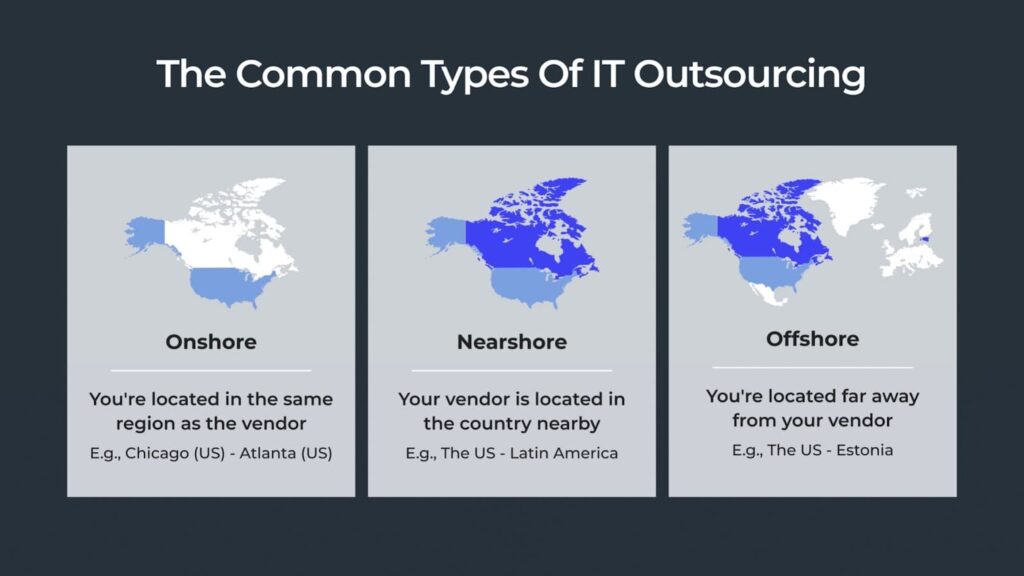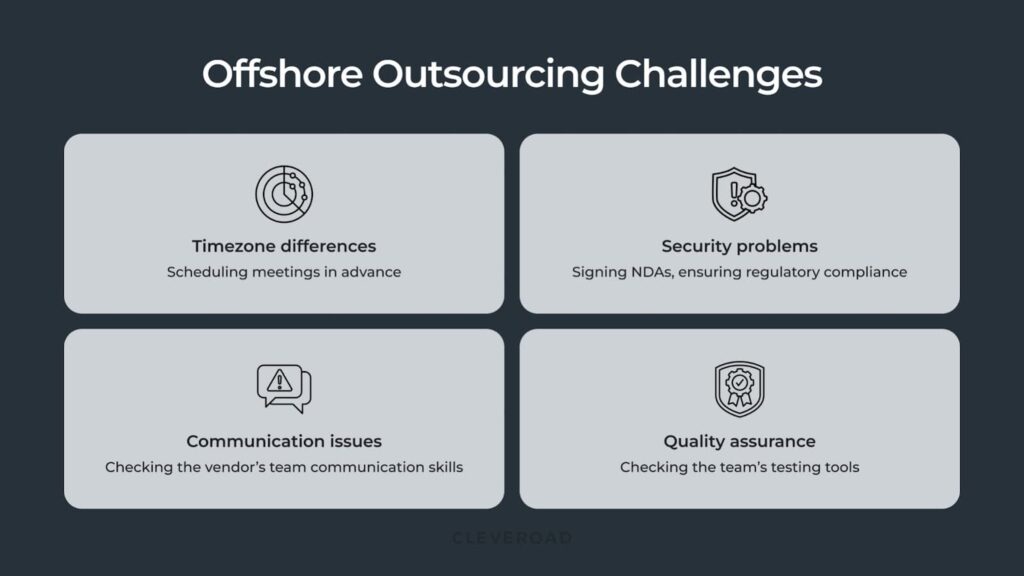Outsourcing some of your tasks to professionals can simplify the process of creating your software product and meeting deadlines, managing staff, and handling the technical aspects of the project.
This post aims to assist you in determining if engaging in remote software development is the appropriate collaboration model for your company. Additionally, you will acquire valuable insights into the advantages of this development approach. Lastly, we will offer guidance on how to avoid common mistakes when choosing and collaborating with a software outsourcing partner.
The Essence of Offshore Software Development
Offshore product engineering involves the transfer of a development project, either entirely or partially, to a third-party IT vendor situated in a distant location. This vendor generally offers reduced labor costs while granting access to a wider talent pool and advanced technologies, making it an economically appealing choice.
For example, if your company is located in the US, you can cooperate with a skilled and cost-efficient IT partner from countries in Central and Eastern Europe (CEE) like Estonia, Poland, or Ukraine. Similarly, if your business is in Australia, you can delegate product engineering to a remote company in the CEE region or Southeast Asia.
Involving remote teams enables you to shift the responsibility of creating digital products and overseeing the engineering team. It also provides the benefit of accessing specialists globally, rather than being restricted to your local area or country.
However, there are specific considerations when working with an international partner. A significant time zone difference due to the geographical distance between you and your remote partner can impact your workflow. Additionally, cultural and language barriers may emerge, leading to potential miscommunication, delays, and misunderstandings that can influence your project’s timeline and budget. These issues can be addressed by carefully selecting a technical partner and reviewing their customer feedback.

The essential types of outsourcing you should consider
Advantages of Offshore Software Development
The advantages of offshore software development, including cost-effectiveness, faster implementation, and access to skilled talent, are undeniable and can greatly improve your software development process.
One of the most convincing benefits of offshore software development is its cost-effectiveness. Many global software service providers offer top-notch services at competitive rates. Central Europe, for example, has become popular due to its proficient professionals, government backing, and minimal taxes for the IT sector, delivering exceptional value for money.
Offshore software development also provides the benefit of quicker implementation. Teaming up with an international software service provider reduces the time spent on recruitment. This enables the rapid formation of a team with the required expertise, leading to swifter project completion and product launch.
Access to skilled talent. Partnering with global IT companies provides access to a diverse pool of proficient professionals with expertise in various business domains, streamlining the hiring process and allowing the recruitment of individuals with diverse skills and experience, creating exciting opportunities for your projects.
Scalability. Offshore software development teams abroad can readily adjust their workforce to meet the changing needs of your project. This flexibility allows for resource optimization and cost control throughout the project lifecycle.
Reduced development risks. Collaboration with outsourcing professionals ensures thorough testing and debugging of the final product. Offshore software development projects typically involve a project manager and a QA team to ensure product quality.
Common Challenges in Offshore Software Development
In offshore IT development, there are several prevalent challenges that organizations often encounter. It is crucial to gain an in-depth understanding of these challenges in order to effectively navigate through the complexities of outsourcing collaboration and devise suitable solutions.
Time zone discrepancies
Differences in time zones are critical when collaborating with remote IT development teams. Communication may take longer if you and your vendor are in different time zones. Moreover, product development may experience delays if the organization has urgent questions requiring your response and approval.
Communication challenges
One of the most common issues in international software development is communication, which can stem from various factors. For instance, communication may be hindered by the vendor’s limited proficiency in English. To mitigate this, choose an IT partner carefully, assess their English skills in advance, or address the matter directly with the company’s representatives or team members.
Security obstacles
Data leakage is one of the biggest challenges today, especially when working with international IT companies that require sharing sensitive information. A reputable company always prioritizes data security, utilizing strong technologies such as user privacy policies, encrypted data storage, and ensuring compliance with regulations and security standards like GDPR, HIPAA, FMIA, KYC, etc.
Quality assurance
Quality assurance (QA) plays a critical role in offshore software development by ensuring that the final product meets both business and technical requirements. It involves continuous testing, bug detection, and performance optimization throughout the development lifecycle to prevent costly errors. A well-structured QA process helps maintain high standards and ensures smooth collaboration with remote teams, even across different time zones.

Best Practices for Offshore IT Development
When outsourcing software development to an offshore IT company, it’s important to consider which practices to implement.
Choose a reliable offshore IT partner
Selecting a trustworthy technical partner with experience and reliability is essential for the success of offshore software development. Here are some ways to find a dependable outsourced IT partner:
- Explore popular outsourcing destinations and choose the most suitable one
- Browse platforms like Clutch or GoodFirms
- Read client reviews
Identify your business needs
Defining your business requirements is the cornerstone of a successful offshore IT outsourcing partnership. This involves thoroughly understanding your:
- Project objectives
- Desired features
- Target audience
- Project budget
By clearly outlining these requirements from the start, you can effectively communicate your needs to potential offshore vendors, ensuring they have the expertise and resources to deliver a solution that aligns with your business objectives.
Establish your business objectives
Having well-defined objectives is crucial for offshore software development company to understand their tasks and avoid constraints, which can lead to decreased productivity and increased project risk, ultimately impacting your business’s profitability. Clarity in offshore programming services will also suffer without clear business goals. Setting clear, achievable goals for your offshore team is vital for the success of your software project.
Implement effective project management
You and your IT vendor should adopt robust project management methodologies such as Agile or Scrum to ensure adaptability and responsiveness to changes. Utilize project management tools like Jira, Trello, or Asana to monitor progress, assign tasks, and manage deadlines. Additionally, clearly define roles and responsibilities to prevent confusion and ensure accountability.
Establish clear communication
At this stage, you and your remote IT provider should define preferred communication channels and determine communication frequency. This ensures consistent and clear information flow throughout engagement. A structured communication plan with your IT remote vendor minimizes misunderstandings, fosters a collaborative environment during remote software project completion, and facilitates timely decision-making.
Conclusion
We’ve described only the basics you should know about remote software development. To obtain the full picture, you should apply to a skilled remote software development company. They will guide you through the entire process, from project planning to implementation, ensuring tailored solutions that meet your business needs while maximizing cost efficiency and delivering high-quality results.

Comments are closed